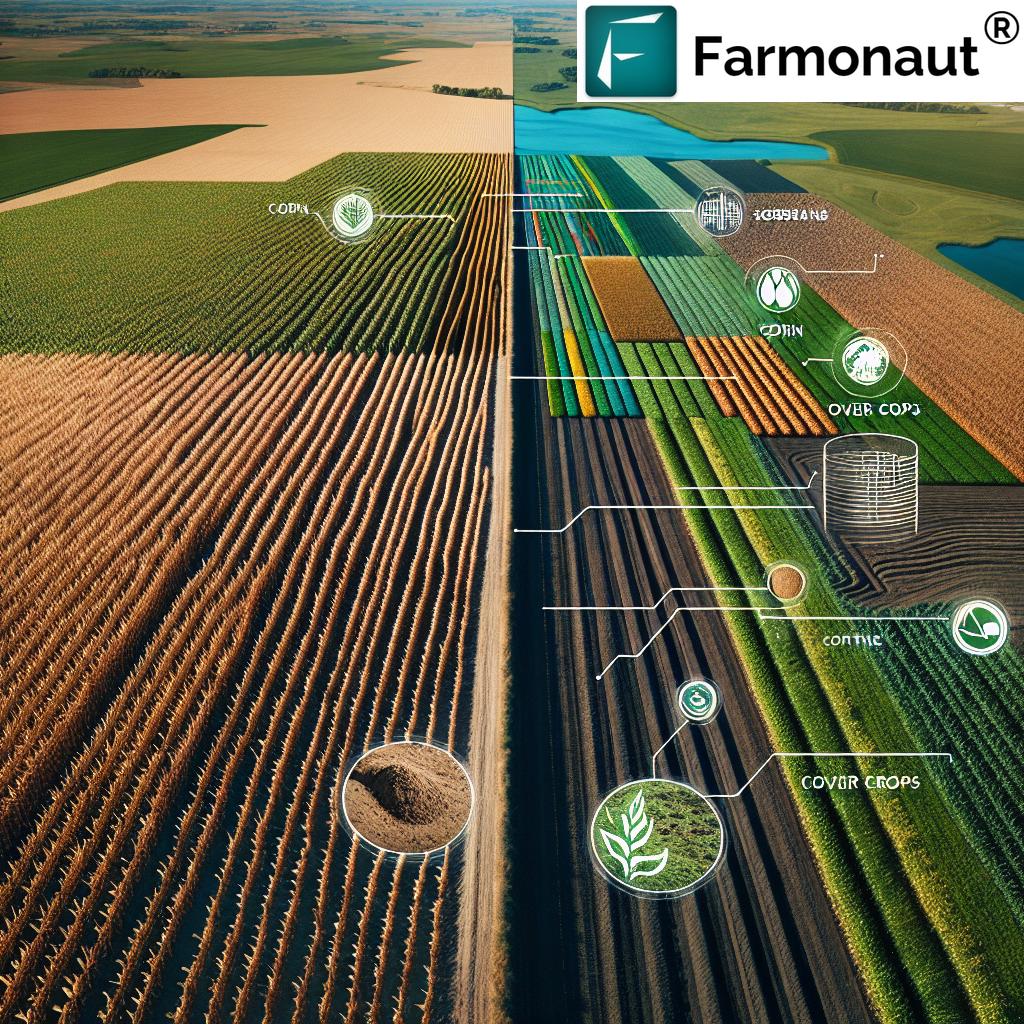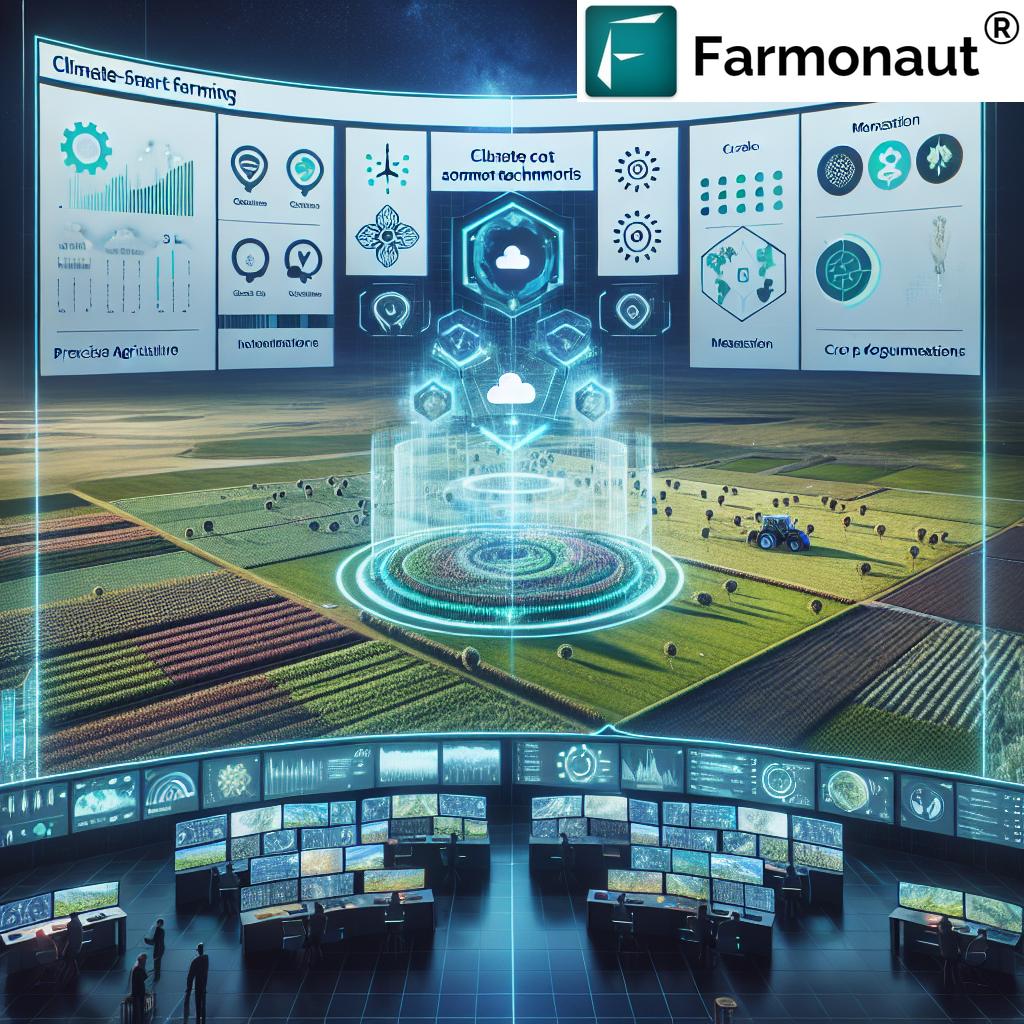Transforming American Agriculture: Climate-Smart Strategies for Sustainable Farming in the US
“US agriculture committees are exploring over 20 climate-smart strategies, including carbon sequestration and crop diversification.”
As we delve into the critical intersection of climate change and agriculture, it’s clear that the future of farming in America is undergoing a profound transformation. Recent hearings in the House and Senate Agriculture Committees have brought to light the pivotal role that farmers, foresters, and ranchers play in addressing the climate crisis. In this comprehensive exploration, we’ll examine the emerging landscape of sustainable farming practices and agricultural climate solutions that are shaping the future of American agriculture.

The Imperative for Climate-Smart Agriculture
The urgency of addressing climate change within the agricultural sector cannot be overstated. As stewards of the land, American farmers are uniquely positioned to implement practices that not only mitigate the effects of climate change but also enhance the resilience and productivity of their operations. The recent discussions in Washington underscore a shift towards flexible, voluntary programs tailored to farmers’ needs, promoting climate-smart agriculture and soil health management.
Key strategies emerging from these discussions include:
- Carbon sequestration in agriculture
- Expansion of conservation programs for farmers
- Crop diversification strategies
- Implementation of agritech innovations
These approaches not only address environmental concerns but also offer potential economic benefits for farmers, aligning ecological stewardship with agricultural prosperity.
The Role of Technology in Sustainable Farming
In the quest for more sustainable and efficient farming practices, technology plays a crucial role. Companies like Farmonaut are at the forefront of this agricultural revolution, offering cutting-edge tools for precision farming and resource optimization. Through satellite-based farm management solutions, Farmonaut provides valuable services such as real-time crop health monitoring, AI-based advisory systems, and resource management tools.
Explore Farmonaut’s innovative solutions:
These technological advancements enable farmers to make data-driven decisions, optimize resource use, and implement climate-smart practices more effectively.
Science-Based Policies and Research Investment
The hearings in Washington have emphasized the importance of science-based policies and significant investment in research to support farmers in adopting climate-friendly practices. This focus on evidence-based approaches ensures that the strategies implemented are not only effective in mitigating climate change but also practical and economically viable for farmers.
Key areas of research and policy development include:
- Enhancing soil health and carbon storage capacity
- Developing drought-resistant crop varieties
- Improving water management techniques
- Advancing renewable energy integration in farm operations
By fostering collaboration between rural communities, research institutions, and climate initiatives, the agricultural sector is poised to make significant contributions to environmental sustainability.
The Power of Conservation Programs
Expanding conservation programs for farmers is a cornerstone of the climate-smart agriculture strategy. These programs provide financial incentives and technical assistance to farmers who implement practices that conserve natural resources and promote environmental stewardship. Some key conservation practices include:
- Cover cropping to improve soil health and reduce erosion
- No-till farming to minimize soil disturbance and retain carbon
- Riparian buffers to protect waterways and enhance biodiversity
- Precision nutrient management to reduce fertilizer runoff
By participating in these programs, farmers can contribute to climate change mitigation while potentially improving their farm’s productivity and resilience.
“Recent hearings emphasize flexible, voluntary programs for 2 million+ US farmers to adopt climate-friendly practices.”
Crop Diversification: A Key to Resilience
Crop diversification strategies are emerging as a crucial component of climate-smart agriculture. By cultivating a variety of crops, farmers can:
- Enhance soil health through varied root systems and nutrient demands
- Reduce pest and disease pressure
- Improve farm income stability by spreading risk across multiple crops
- Increase biodiversity on agricultural lands
Farmonaut’s satellite-based monitoring systems can assist farmers in implementing and managing diversified cropping systems effectively, providing insights into crop health and performance across various species.
Carbon Sequestration: Farming for the Climate
Carbon sequestration in agriculture represents a significant opportunity for the farming sector to contribute to climate change mitigation. By implementing practices that increase the carbon content of soils, farmers can not only reduce atmospheric CO2 but also improve soil health and productivity. Key carbon sequestration strategies include:
- Adopting no-till or reduced tillage practices
- Implementing cover cropping systems
- Integrating agroforestry practices
- Managing crop residues effectively
These practices not only sequester carbon but also enhance soil structure, water retention, and nutrient cycling, leading to more resilient and productive agricultural systems.

The Role of Extension Services in Climate-Smart Agriculture
Extension services play a crucial role in bridging the gap between research and on-farm implementation of climate-smart practices. These services provide:
- Education and training on new agricultural technologies and practices
- On-site consultations to address farm-specific challenges
- Demonstration projects showcasing successful climate-smart strategies
- Networking opportunities for farmers to share experiences and best practices
By strengthening and expanding extension services, policymakers can ensure that farmers have the support and knowledge needed to successfully transition to more sustainable farming methods.
Agritech Innovations: Precision Farming for Sustainability
Agritech innovations are revolutionizing the way farmers approach sustainability and efficiency. Farmonaut’s platform exemplifies how technology can support climate-smart agriculture through:
- Satellite-based crop health monitoring for precise resource management
- AI-driven advisory systems providing personalized farm management recommendations
- Blockchain-based traceability solutions ensuring transparent and sustainable supply chains
- Resource management tools optimizing water and input use
These technologies enable farmers to make data-driven decisions that not only improve productivity but also reduce environmental impact.
Climate-Smart Agriculture: A Win-Win for Farmers and the Environment
The adoption of climate-smart agricultural practices offers numerous benefits for both farmers and the environment:
- Increased farm resilience to climate variability
- Improved soil health and long-term productivity
- Reduced input costs through more efficient resource use
- Potential new income streams through carbon markets and ecosystem services
- Enhanced biodiversity and ecosystem health
By aligning agricultural practices with climate goals, we can create a more sustainable and prosperous future for American farming.
The Future of Agricultural Policy and Climate Change
Agricultural policy and climate change are becoming increasingly intertwined. As policymakers recognize the critical role of agriculture in both contributing to and mitigating climate change, we can expect to see:
- Increased funding for climate-smart agriculture research and implementation
- Policy incentives for farmers adopting sustainable practices
- Integration of climate resilience into farm support programs
- Development of carbon markets tailored to agricultural sequestration
These policy developments will play a crucial role in shaping the future of American agriculture and its role in addressing climate change.
Soil Health Management: The Foundation of Sustainable Agriculture
Soil health management is at the core of climate-smart agriculture. Healthy soils are more resilient to climate extremes, store more carbon, and support more productive crops. Key soil health practices include:
- Minimizing soil disturbance through conservation tillage
- Maintaining year-round living roots in the soil
- Increasing plant diversity through crop rotation and cover cropping
- Integrating livestock and crop production systems
By focusing on soil health, farmers can create a strong foundation for sustainable and climate-resilient agricultural systems.
Water Management in a Changing Climate
Effective water management is becoming increasingly critical as climate change alters precipitation patterns and increases the frequency of droughts. Climate-smart water management strategies include:
- Implementing precision irrigation systems
- Adopting drought-tolerant crop varieties
- Improving soil water retention through organic matter management
- Utilizing water harvesting and storage techniques
Farmonaut’s satellite-based monitoring can assist farmers in optimizing their water use by providing real-time data on soil moisture and crop water requirements.
Explore Farmonaut’s API for advanced agricultural data integration
The Role of Forestry in Agricultural Climate Solutions
Forestry practices play a significant role in agricultural climate solutions. Integrating trees into agricultural landscapes through agroforestry can:
- Increase carbon sequestration potential
- Provide windbreaks and reduce soil erosion
- Enhance biodiversity and create wildlife habitats
- Diversify farm income through timber and non-timber forest products
By recognizing the interconnectedness of forestry and agriculture, we can develop more holistic approaches to land management and climate change mitigation.
Empowering Farmers Through Education and Resources
To successfully transition to climate-smart agriculture, farmers need access to education, training, and resources. Key components of farmer empowerment include:
- Continuing education programs on climate-smart practices
- Access to cutting-edge research and technologies
- Financial support for implementing new practices
- Peer-to-peer learning networks and mentorship programs
By investing in farmer education and support, we can accelerate the adoption of sustainable practices across the agricultural sector.
Climate-Smart Agriculture Strategies and Their Impact
| Strategy | Description | Estimated Carbon Sequestration (tons CO2/acre/year) | Potential Yield Increase (%) | Farmonaut Solution |
|---|---|---|---|---|
| Cover Cropping | Planting non-cash crops during off-seasons to protect and enrich soil | 0.37 – 1.03 | 3 – 10 | Satellite monitoring for cover crop health and management |
| No-Till Farming | Minimizing soil disturbance by planting without tilling | 0.15 – 0.33 | 5 – 15 | Soil health monitoring and advisory services |
| Crop Rotation | Alternating crops in a field to improve soil health and break pest cycles | 0.20 – 0.50 | 10 – 20 | Crop performance analysis across rotations |
| Precision Agriculture | Using technology to optimize inputs and management practices | 0.10 – 0.40 | 15 – 30 | AI-driven advisory system for precise resource management |
| Agroforestry | Integrating trees with crops or livestock | 2.20 – 5.90 | Variable | Satellite imaging for tree health and growth monitoring |
Conclusion: A Sustainable Future for American Agriculture
As we navigate the challenges of climate change, the transformation of American agriculture towards more sustainable and resilient practices is not just necessary—it’s inevitable. Through the adoption of climate-smart strategies, supported by innovative technologies like those offered by Farmonaut, and guided by science-based policies, the agricultural sector is poised to make significant contributions to climate change mitigation while ensuring food security and rural prosperity.
The path forward requires collaboration between farmers, policymakers, researchers, and technology providers. By working together, we can create an agricultural system that is not only productive and profitable but also environmentally sustainable and climate-resilient. The future of American farming is bright, powered by innovation, stewardship, and a commitment to the health of our planet.
Frequently Asked Questions (FAQ)
- What is climate-smart agriculture?
Climate-smart agriculture refers to farming practices that increase productivity while adapting to climate change and reducing greenhouse gas emissions. It includes strategies like precision farming, conservation tillage, and crop diversification. - How does carbon sequestration in agriculture work?
Carbon sequestration in agriculture involves practices that capture and store carbon in soil and plant biomass. This includes no-till farming, cover cropping, and agroforestry, which help remove CO2 from the atmosphere and improve soil health. - What role does technology play in sustainable farming?
Technology, such as Farmonaut’s satellite-based solutions, plays a crucial role in sustainable farming by providing real-time data on crop health, soil conditions, and resource use. This enables farmers to make informed decisions that optimize yields while minimizing environmental impact. - How can farmers benefit from adopting climate-smart practices?
Farmers can benefit through increased resilience to climate variability, improved soil health, reduced input costs, potential new income streams from carbon markets, and long-term sustainability of their operations. - What policy changes are being considered to support climate-smart agriculture?
Policymakers are considering expanded conservation programs, research funding, financial incentives for sustainable practices, and the development of agricultural carbon markets to support the transition to climate-smart agriculture.
Farmonaut Subscriptions






